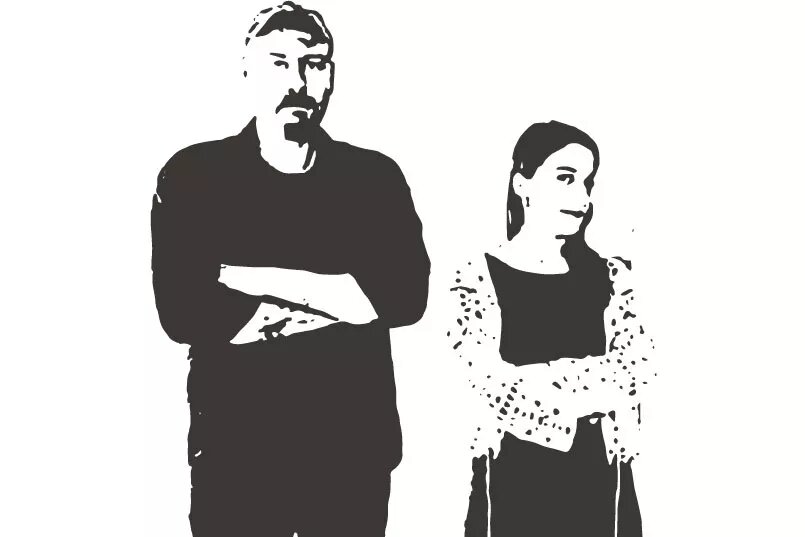How did the newcomers of the Self-Help Promotion Program integrate into the local community of a decentralised region like Rapsani, and how did they manage to influence it in a positive way? As the PPA workers who collectively wrote this article point out, over time and through the trusting relationships that have been developed, their actions have become more adapted to people’s needs, more enriched, more collaborative, and more participatory.

The Programme
We work at the Self-Help Promotion Program (PPA), a programme of the Psychology Department of Aristotle University of Thessaloniki for the support of people with addiction issues.
We work at the Self-Help Promotion Program (SHP), a programme of the Psychology Department of the Aristotle University of Thessaloniki, for the support of people with addiction issues. The pillars on which the Programme is based are mutual help and support of people in collective contexts, the concept of community, and collaborating with people rather than providing services to people. After all, we believe that the problem of addiction, much like other psychosocial problems, is a result of the orientation of the modern development model and the impasses of Western civilization, and this is why the focus of our actions and interventions is based on the development of communal principles and practices.
Rapsani
A few years ago, in 2016, we were invited to become active in the community of Rapsani on the occasion of the creation of the new structure of the PPA, the Programme of Inclusive, Educational and Cultural Activities “Rapsani Guesthouse”.
The transition from an urban environment to a semi-mountainous village was a big change for us. Rapsani is a small village at the foothills of Mount Olympus with a long history and development in modern times, natural beauty, and cultural tradition. However, the conditions we encountered in the village did not resemble any of the above. Closed houses, few children going to school in a nearby village, mostly elderly permanent residents, closed public spaces, and almost no productive potential.
The people of the village welcomed us, and some of them were very helpful in our initial integration. We encountered difficulties in finding housing, for although there are plenty of vacant houses, the owners are at least reluctant to make them available.
Social life in the village, especially during the winter months, is very limited in terms of stimuli and activities. However, the natural environment, the walks, the quietness, the fresh air, and the climate of the village offer a unique quality of life not found in urban environments.
The first steps in the village
A first task for us was to connect with the active members of the local community and to get to know and build relationships with the people of the village, as a basic condition for creating actions together. The connection and cooperation with the manager of the municipal library, who already had a rich activity in the local community, as well as the connection with key people in Rapsani, who acted as facilitators for us (members of the women’s association, professionals of the village, community agents), played a decisive role in our effort to penetrate the community of Rapsani from the beginning. We therefore gave time to get to know the place, the people, and the way the community of Rapsani works.
Our actions
Apart from the integration activities for the members of our Programmes in Thessaloniki and Larissa and the educational programmes for health professionals, our aim was to develop activities to activate and develop the local community. Very early on, during our presence in Rapsani, we organised cultural, historical, folklore, ecological, healthcare, and educational activities. In an effort to promote the cultural flourishing of the village and the wider region, we have organised nature walks, games for all ages, theatre and cinema performances, visual arts, music, and book presentations on the one hand, but also educational seminars, lectures, and meetings on topical issues concerning the development and prospects of the local community on the other.
Over the years and through the trusting relationships that have developed, actions adapt more and more to people’s needs, enriching and becoming more cooperative and participatory.
Limitations, questions, perspectives
The creation of a culture of creativity, triggered by our activities in collaboration with local institutions, especially during the summer months when the village comes alive, suggests new ideas and perspectives for action and working together. We find that cooperative educational actions through culture, as well as our own engagement in the context of a decentralised (but neglected) community, are of great importance for the empowerment of the local community and the development of values and practices such as solidarity, cooperation, mutual interest, and collective action.
In an attempt to reflect, based on our experience of living and loving the village throughout the year, but also on our discussions with the locals, we realize the limitations of our actions and interventions in the existing conditions: lack of primary production; absence of young people and families from the village for most of the year (and lack of motivation for decentralization); lack of infrastructure in various sectors; and unorganized utilization (or abandonment) of the natural, social, and cultural resources of the village. Who will choose to settle in the village? With what motive and perspective?
These limitations and concerns lead us and challenge us to further open the dialogue with the residents, the institutions, and the local authorities on the possibilities of highlighting and making use of the community’s resources towards a “mild” development. A development that is based on the needs of the people who live in the village and of those who want to try it out, but that is also obviously adapted to the basic needs of modern times.
Contact Information
Self-Help Promotion Program
Odysseos 19 (inside the lodge), Vardari area, 1st and 2nd floor, 54629, Thessaloniki
Tel.: +30 2310500477
Email: thessaloniki@selfhelp.gr
Website, Facebook, Instagram, Twitter, YouΤube
Self-Help Promotion Program’s Rapsani Guesthouse
Tel.: +30 2495061191
Email: rapsani@selfhelp.gr